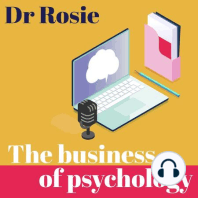39 min listen

Who are you helping? Three ways to specialise your psychology or therapy practice
Who are you helping? Three ways to specialise your psychology or therapy practice
ratings:
Length:
18 minutes
Released:
Sep 1, 2023
Format:
Podcast episode
Description
Who are you helping? Three ways to specialise your psychology or therapy practiceHello and welcome to today's episode of The Business of Psychology Podcast. We are continuing today with our special theme around specialisation and how you can find the people that you really want to help in your practice. Full show notes of this episode are available at The Business of PsychologyLinks & References:Episode 103: Why you should specialise – old gold that is still importantEpisode 61: Turning a practice into a service with Dr Melanie LeePlan an overwhelm free practice: Define your specialism & find your focus in this free webinar (Psychology Business School)Rosie on Instagram:@rosiegilderthorp@thepregnancypsychologistThe first thing we need to talk about today are the reasons to specialise.Then I'm going to talk you through a few different ways specialisation can look in your practice, because I've been teaching about specialising for over three years now, and what I've come to realise is that like with everything in business and marketing, there is no one size fits all approach to specialisation.Then finally, I've got something for you if you're not quite sure of your specialism yet, or if all of this makes your head feel a bit fuzzy. So stay tuned to hear about that. Why do I think it's important for you to specialise in your practice now? If you've listened to this podcast for a while, you'll know that I'm really passionate about specialisation, and that is not just because it makes life easier, but it really does. It is also because it makes it easier to provide what our clients really need. We're in a fairly unique industry in mental health, in that we're in an industry where people are not only trusting us with their money, they're also making a huge emotional investment and taking a huge emotional risk when they come to work with us.My belief is that we need to respect that and pay attention to what is going to reassure people that we can really help them. To do that, we need to build our authority in the best way that we can, and all that really means is proving to people that we care about them, that we invest lots of time in learning how to help people like them, and that we're staying on top of the evidence base. In order to do that, I just do not believe we can do that properly as generalists. Now that might be controversial. I know that people disagree with me, and I think that it may be less true if you're working in the NHS because there you have access to CPD and colleagues and perhaps a wide range of supervision. But in private practice, let's be real, you are busy. There's only so many papers you can read, there's only so many projects you can be working on at once, only so many evidence bases you can keep on top of.I think that patients that come to see us in private practice deserve to feel special, and they deserve to feel that the clinician that is talking to them cares deeply about the struggles that they're coming to them...
Released:
Sep 1, 2023
Format:
Podcast episode
Titles in the series (100)
Tragedy, trauma and mess. How a Psychologist helped the survivors of Grenfell tower. by The Business of Psychology